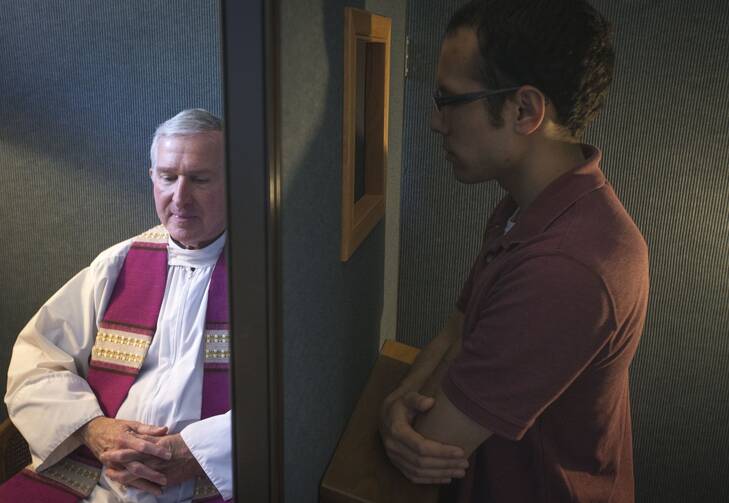WILMINGTON, Del. (OSV News)—The Delaware General Assembly is taking aim at a basic tenet of the Catholic Church and wants to break the seal of confession between a priest and penitent.
House Bill 74 would do away with the privilege between priest and penitent in a sacramental confession by requiring priests to report information relating to child abuse and neglect that is shared in a confessional.
The Diocese of Wilmington said priests are prohibited from breaking the seal of confession and are bound to keep the confidence of penitents in the sacrament of reconciliation.
“The sacrament of confession and its seal of confession is a fundamental aspect of the church’s sacramental theology and practice. It is non-negotiable,” the diocese said in a prepared statement March 6.
“It would be a clear violation of the First Amendment for the government to interfere in this most sacred and ancient practice of our faith.”
“No Catholic priest or bishop would ever break the seal of confession under any circumstances. To do so would incur an automatic excommunication that could only be pardoned by the pope himself,” it added. “It would be a clear violation of the First Amendment for the government to interfere in this most sacred and ancient practice of our faith.”
“While we support initiatives to make Delaware a safer place for minors and vulnerable adults,” the diocese continued, “HB 74 would not contribute to such efforts in any meaningful way.”
It said priests “are already mandatory reporters under Delaware’s child abuse reporting law in all circumstances” other than the sacrament of confession.
In addition, the statement said, the diocese’s “own internal policies require all clergy to report suspected incidents of child abuse to civil authorities.”
HB 74 “would not only infringe on the rights of a variety of faith communities, it would also give rise to a number of unintended consequences,” the diocese said.
HB 74 “would not only infringe on the rights of a variety of faith communities, it would also give rise to a number of unintended consequences,” the Diocese of Wilmington said.
It would create a requirement in law “that would be nearly impossible to meet in a practical sense,” because “the overwhelming majority of sacramental confessions are anonymous,” and “wholly impossible to meet without violating a fundamental tenet of our faith,” it said.
“The Diocese of Wilmington considers the protection of the vulnerable to be one of the most important aims of public policy,” the statement said. “However, this legislation would not advance that vital objective.?”
Within the next few weeks, the House Judiciary Committee could hold a hearing on HB 74, whose primary sponsor is Democratic Rep. Eric Morrison. The measure has two additional sponsors as well as eight co-sponsors.
In Vermont and Utah, state lawmakers introduced similar legislation. Two other states, Washington and Kansas, are advancing measures to require clergy be listed as mandatory reporters of child abuse or neglect. They are among a handful of states in the U.S. that do not already require this. However, the Kansas measure, introduced by Sen. Tom Holland, does not include protections for religious confessions.
On March 3, Bishop Christopher J. Coyne of Burlington, Vermont, testified at a state Senate Judiciary Committee hearing that the church opposes an effort by lawmakers to remove an exemption from Vermont’s child abuse and neglect reporting laws that currently protects priests from having to violate the seal of confession if a penitent confesses to child abuse or neglect.
“A priest faces excommunication if he discloses the communication made to him during confession,” Bishop Coyne said. “And the sacramental seal of confession is the worldwide law of the Catholic Church, not just the (statewide) Diocese of Burlington, Vermont.”
Bishop Oscar A. Solis called the bill “an intrusion into our fundamental right to the free exercise of our religion.”
The Utah Legislature ended its 45-day session late March 3. Lawmakers had introduced four measures that would have sought to require clergy to report child abuse, but none of them got a public hearing this session.
In an early February letter to Catholics of the Salt Lake City Diocese, Bishop Oscar A. Solis urged the faithful of the statewide diocese to contact their legislators to ask that they oppose a bill that, like in Delaware and Vermont, would have required priests to violate the seal of the confessional if a penitent admitted child abuse or neglect.
He called the bill “an intrusion into our fundamental right to the free exercise of our religion” and said it “goes against the long-standing tradition of our Catholic Church and other faith denominations who take very seriously the seal of confidentiality as a sacred trust that cannot be violated even at the cost of liberty and death.”
“The Catholic Church believes that sexual misconduct of any kind by church personnel is an affront to human dignity of the person and the mission of the church,” Bishop Solis wrote. “The spiritual well-being of all victims, their families and others in the community is always of particular concern to the church. The Diocese of Salt Lake City takes allegations of sexual misconduct involving minors and vulnerable persons seriously.”








